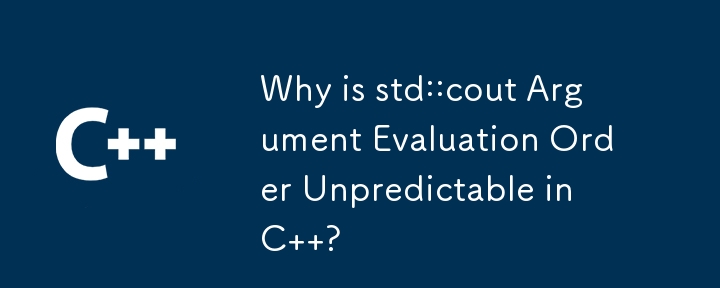

Evaluating Arguments in std::cout Insertion Order
In C , the order of argument evaluation in expressions using the std::cout insertion operator can be confusing. Consider the following code snippet:
#include <iostream>
bool foo(double &m)
{
m = 1.0;
return true;
}
int main()
{
double test = 0.0;
std::cout << "Value of test is : \t" << test << "\tReturn value of function is : " << foo(test) << "\tValue of test : " << test << std::endl;
return 0;
}The output of this code is surprising:
Value of test is : 1 Return value of function is : 1 Value of test : 0
Understanding this output requires delving into the order of argument evaluation.
Unspecified Evaluation Order
Typically, C doesn't specify the evaluation order of arguments in an expression. This is up to the compiler to decide. However, there are some exceptions, such as:
Left-to-Right Evaluation Assumption
It's common to assume left-to-right evaluation for std::cout insertions, but this is not guaranteed. In our example, the "shadowed" test in the third argument is evaluated before the call to foo, which modifies it.
Resolving the Confusion
To ensure the intended evaluation order, split the expression into separate statements:
double test = 0.0; std::cout << "Value of test is : \t" << test << std::endl; std::cout << "Return value of function is : " << foo(test) << std::endl; std::cout << "Value of test : " << test << std::endl;
This code correctly outputs:
Value of test is : 0 Return value of function is : 1 Value of test : 1
The above is the detailed content of Why is std::cout Argument Evaluation Order Unpredictable in C ?. For more information, please follow other related articles on the PHP Chinese website!
 How do I set up WeChat to require my consent when people add me to a group?
How do I set up WeChat to require my consent when people add me to a group?
 The difference between access and trunk ports
The difference between access and trunk ports
 How redis solves data consistency
How redis solves data consistency
 How to delete a folder in linux
How to delete a folder in linux
 How to check dead links on your website
How to check dead links on your website
 What is fil coin?
What is fil coin?
 How to use findbugs
How to use findbugs
 Reasons why the homepage cannot be modified
Reasons why the homepage cannot be modified




